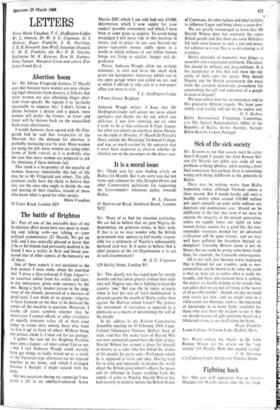Sir : This ghastly war has raged now for twenty
months and has taken greater civilian than mili- tary toll. Nigeria says she is fighting to keep the country 'one.' But can she be taken seriously when in fact her war of 'total mobilisation' is directed against the people of Biafra rather than against the Biafran armed forces? She prefers the instrument of starvation as opposed to a plebiscite as a means of determining the will of the people.
In his address to the Biafran Consultative Assembly meeting on 10 February 1969, Lieut. Colonel Odumegwu Ojukwu, Biafra's head of state, said that 'the many faces of Harold Wil- son now unmasked cannot bear the light of day. Harold Wilson has earned a place for himself in history as a ruler who has defied the wishes of his people, his party and a Parliament which he is supposed to serve and obey. Having tried for so long and repeatedly to deceive the world about the British government's efforts for peace and its influence in Lagos resulting from the supply of arms to Nigeria, Harold Wilson has had recently to confess, before the British House of Commons, his utter failure and total inability to influence Lagos and bring about a cease-fire.'
We are greatly encouraged to learn that Mr Harold Wilson does not represent the entire British people and that there are some Britishers left with some honour to seek a just and peace- ful solution to a war that is as devastating as it is useless.
Biafra demands of humanity two things—a cease-fire and a negotiated settlement. The cease- fire should be without any preconditions. It is the acceptance of this that will show the sin- cerity of both sides for peace. Why should Nigeria and the British government shy away from the accepted democratic procedures for ascertaining the will and aspiration of a people in cases of dispute?


































 Previous page
Previous page